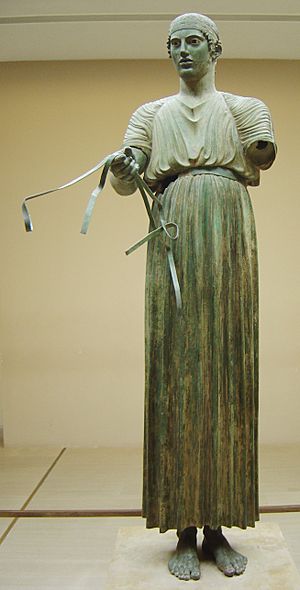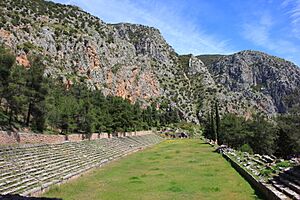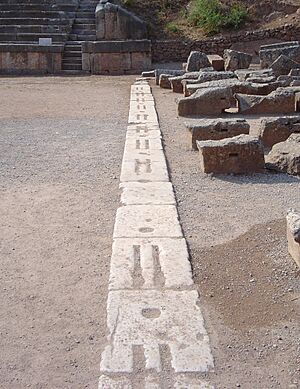Pythian Games facts for kids
The Pythian Games were one of the four big Panhellenic Games in Ancient Greece. They were held to honor the god Apollo at his special place in Delphi. These games happened every four years. They took place two years after the Olympic Games.
The Pythian Games began around 582 BC. Legend says Apollo himself started them. He did this after he defeated a giant snake named Python. These games were very important, second only to the Olympics.
Unlike the Olympics, the Pythian Games also had contests for art and dance. These artistic events were actually older than the sports events. Women were even allowed to compete in some events. Winners received a wreath made of bay laurel leaves. This plant was special to Apollo. Smaller versions of the Pythian Games were held in many other cities.
Contents
Mythology: How the Games Began
The Pythian Games are said to have started because of a mythical serpent named Python. The ancient writer Ovid tells us that the games were created to celebrate Apollo's victory over this snake. Apollo wanted people to remember his great deed.
Python was a huge snake that came from the Earth. It scared the new human beings. Apollo, who used his bow and arrows for hunting, used them to defeat the monster. He shot many arrows until the snake was defeated.
By killing Python, Apollo made the area safe for people. He also claimed the site as his own. After burying the snake, Apollo created the oracle of Delphi. However, killing Python was seen as a crime. So, Zeus said Apollo had to make up for it. Apollo then created the Pythian Games as a way to pay for Python's death.
History of the Pythian Games

The Pythian Games officially started in 582 BC. At this time, a group called the Delphic Amphictyony took charge of the games. This council was made up of twelve Greek tribes. They decided the games would happen every four years. This was two years before and two years after the Olympic Games. They usually took place at the end of August.
Preparations for the games began six months beforehand. Nine citizens from Delphi, called theoroi, traveled to all Greek cities. They announced the start of the games. They also declared a "Sacred Truce" (Hieromenia). This truce protected everyone traveling to Delphi. It also protected Apollo's temple.
If a city was fighting or robbing during this time, its people could not enter the Sanctuary. They could not join the games or ask the Oracle for advice. The truce also let the Amphictyony focus on getting ready for the games. This included fixing temples, streets, and fountains. Many people came from all over Greece, bringing a lot of money to the city.
Even when Christianity grew in the Roman Empire during the 4th century, Delphi remained active. The Pythian Games continued to be celebrated until at least AD 424.
What Happened at the Games
Most records about the Pythian Games were lost over time. But the remaining information shows how grand and important they were. Records from Aristotle tell us about the events. The games lasted for six to eight days. They started with a play showing Apollo's victory over Python.
There was also a big procession and a special sacrifice at the Temple of Apollo. After four days of celebrations, the actual games began.
Events and Competitions
The sports and horse races were similar to those at the Olympics. However, the Pythian Games did not have the four-horse chariot race. They did add running races just for boys.
Unlike the Olympics, where women had their own festival, women could compete at Delphi. They took part in both sports and artistic events. The only female winner we know of was Tryphosa. She won the girl's stadion running race.
The sports events included four types of running races:
- Stade (a short sprint)
- Diaulos (a double sprint)
- Dolichos (a long-distance race)
- Hoplitodromos (a race where runners wore Hoplite armor)
Other sports were wrestling, boxing, pankration (a mix of boxing and wrestling), and the pentathlon (five events). These sports were added to the games over time.
The last day of the games was for horse races. These included:
- Harness racing
- Synoris (a chariot pulled by two horses)
- A chariot pulled by four horses
- Racing with just a horse (no chariot)
These races took place in a hippodrome (horse track) near the sea. Other sports contests were held in the Stadium. During the Roman period, acting competitions were also added. These took place in the theater.
Music Contests
Pausanias, who wrote in the 2nd century AD, said the oldest contest at Delphi was singing the Hymn to Apollo. Apollo was the god of arts and music. The first games run by the Delphic Amphictyony (around 586 BC) had contests for singing with a cithara (a type of lyre). There were also separate contests for playing the aulos (a wind instrument) solo. Another contest was for playing the aulos with singing.
The aulos contest with singing was stopped after the second games. People thought the music was sad and unlucky. Pythocritus of Sicyon was a famous aulos player. He won six times in a row. He also played the aulos for the pentathlon at the Olympics.
Poetry, Prose, and Drama
Poetry and prose contests were also a big part of the Pythian Games. Judges chose the winners. Contests for Tragic acting likely included both single performances and full plays.
Painting Competitions
Painting competitions were added in the middle of the 5th century BC.
Prizes for Winners
Winners at the Pythian Games did not receive money. Instead, they got a wreath of bay laurel leaves. These leaves were sacred to Apollo. The wreaths came from the city of Tempe in Thessaly. This was similar to other Panhellenic games. All these games were called "stephanitic" games, meaning "crown" games. Smaller versions of the Pythian Games were held in many other cities across Greece.
Pindar and the Pythionikoi
Pindar was a famous poet from Thebes. He wrote 45 poems to honor winners at the Panhellenic games. Twelve of these poems were called Pythionikoi. They were written for winners at the Pythian Games. In these poems, Pindar praised the winners and their families. He also wrote about the ideals of the time, like being noble and athletic.
The Pythionikoi as a Source of Information
Pindar wrote lyric poetry. Most of his surviving works are "Victory Odes" (Epinikia). These were songs sung by a chorus when a winner returned home.
Pindar's poems were often for rich families and rulers. So, his Odes show the ideals of the wealthy people of that time. The poems praised the winner and added stories from mythology. To understand these poems, people needed to be well-educated. Pindar used his work to talk about the victory. He also highlighted the family's history and their connections across Greece.
There are 45 Victory Odes in total. They celebrate winners in the four most famous Panhellenic games: the Olympic, the Nemean, the Pythian, and the Isthmian Games. The 12 hymns celebrating victories in the Pythian Games give us details about each athlete's competition.
Here are some examples of winners from Pindar's poems:
- In 498 BC, Hippokles from Thessaly won the children's diaulos race.
- In 490 BC, Midas from Akragas won a music contest as a flute player.
- In 486 BC, Megakles from Athens won the chariot racing.
- In 475 or 474 BC, Hieron of Syracuse won the chariot racing.
- In 474 BC, Thrasydaeus from Thebes won the children's stadium race. Telesikrates from Cyrene won the armed race.
- In 470 BC, Hieron from Aetna won the chariot racing.
- In 462/1 BC, Arkesilaus from Cyrene won the chariot racing.
|
 | Laphonza Butler |
 | Daisy Bates |
 | Elizabeth Piper Ensley |



